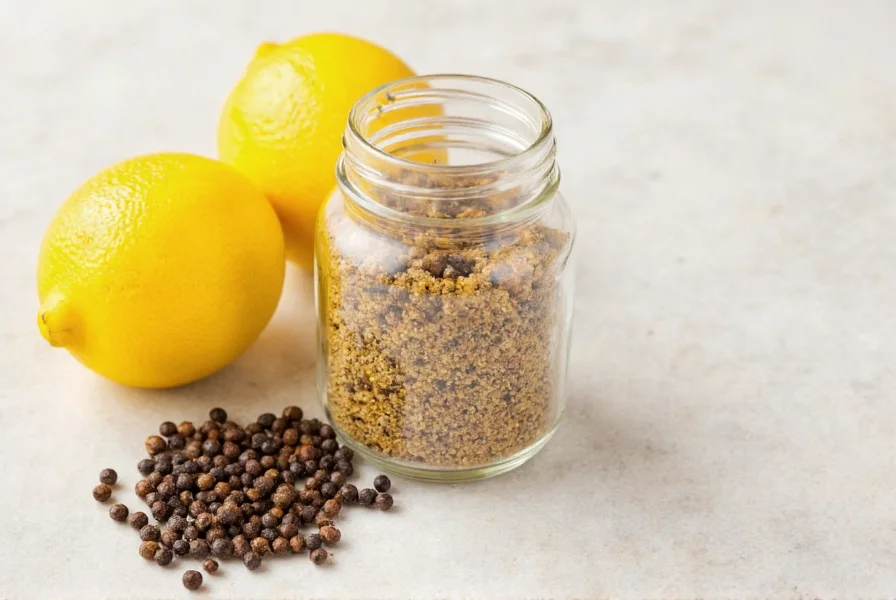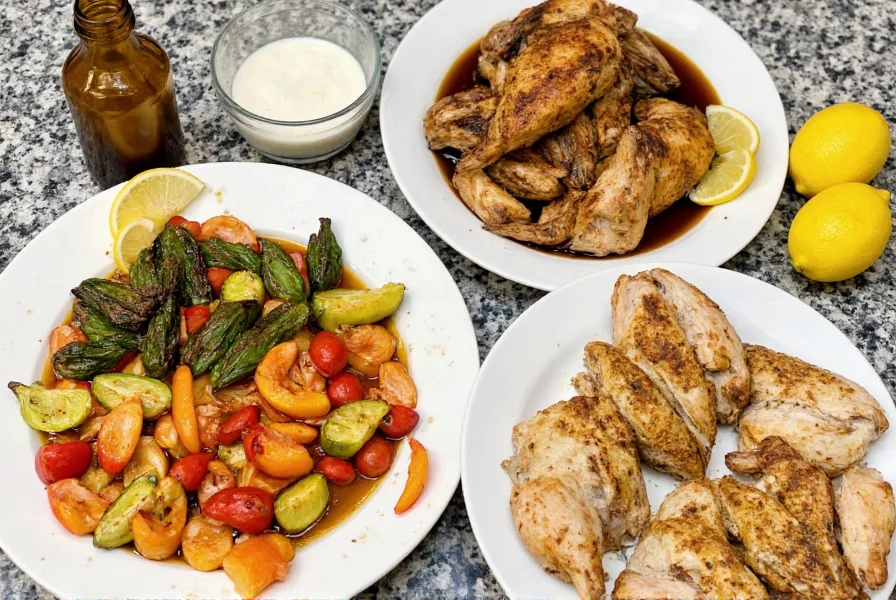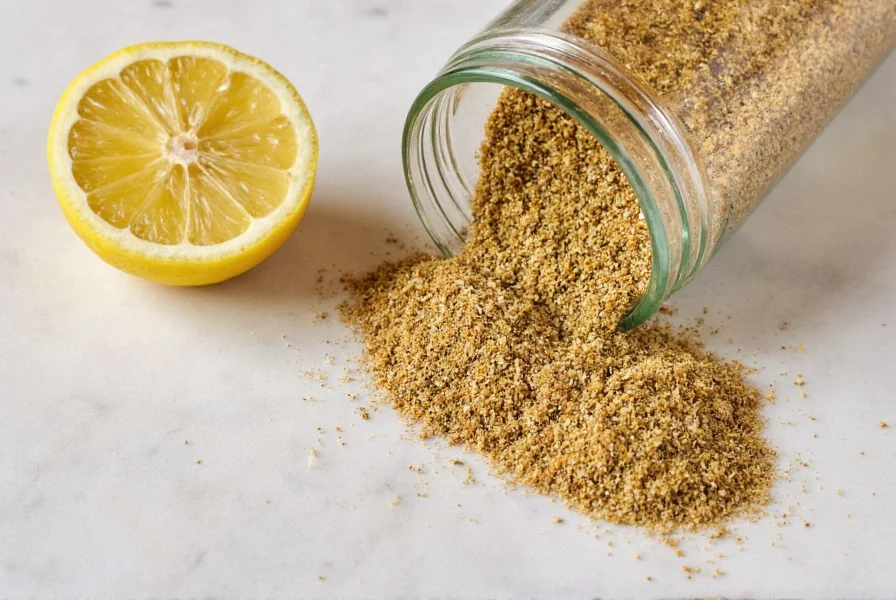The simplest way to make lemon pepper seasoning at home requires just three core ingredients: 2 tablespoons of dried lemon zest, 2 tablespoons of coarsely ground black pepper, and 1 tablespoon of fine sea salt. Combine these in a small bowl, mix thoroughly, and store in an airtight container. This basic ratio creates a balanced seasoning that's brighter and fresher than most store-bought versions, with no preservatives or anti-caking agents.
Creating your own lemon pepper seasoning unlocks a world of fresh flavor that surpasses commercial blends. Unlike mass-produced versions that often contain fillers and preservatives, homemade lemon pepper delivers vibrant citrus notes and robust pepper flavor that transforms ordinary dishes into restaurant-quality meals. The process takes less than 10 minutes with ingredients you likely already have in your pantry, giving you complete control over quality and customization.
Why Make Your Own Lemon Pepper Seasoning
Commercial lemon pepper often contains anti-caking agents, preservatives, and inconsistent flavor profiles due to industrial processing. When you make your own easy homemade lemon pepper recipe, you control every element. Freshly made seasoning provides brighter citrus notes because the lemon oils haven't degraded during prolonged storage. You'll notice an immediate difference in dishes like grilled chicken, roasted vegetables, or simple pasta preparations.

Essential Ingredients Explained
Understanding each component helps you perfect your best lemon pepper seasoning ratio for your personal taste preferences:
| Ingredient | Function | Quality Tips |
|---|---|---|
| Dried Lemon Zest | Provides citrus flavor without moisture | Use organic lemons, dry zest at 170°F for 20 minutes |
| Black Peppercorns | Creates the signature pepper flavor | Grind fresh for maximum piperine content |
| Sea Salt | Enhances and balances flavors | Choose fine grain for even distribution |
| Optional Additions | Customizes flavor profile | Garlic powder, onion powder, herbs |
Step-by-Step Preparation Guide
Follow these steps for perfect how to make lemon pepper without preservatives results every time:
- Dry the lemon zest: Using a microplane, zest 2-3 organic lemons. Spread zest on a baking sheet and dry in oven at 170°F for 15-20 minutes until completely dry but not browned.
- Grind peppercorns: Measure 2 tablespoons whole black peppercorns into a spice grinder. Pulse to medium-coarse consistency - you want visible pepper flakes, not powder.
- Combine ingredients: In a small bowl, mix 2 tablespoons dried lemon zest, 2 tablespoons ground pepper, and 1 tablespoon fine sea salt. Stir thoroughly for even distribution.
- Rest the blend: Transfer to an airtight container and let sit for 24 hours before using. This allows the flavors to meld properly.
Customization Options for Different Palates
The beauty of fresh lemon pepper vs store-bought is your ability to tailor the blend. Consider these variations:
- Mild version: Reduce pepper to 1.5 tablespoons and increase lemon zest to 2.5 tablespoons for a citrus-forward blend ideal for fish
- Spicy kick: Add 1/4 teaspoon cayenne pepper or 1/2 teaspoon crushed red pepper flakes
- Herb-infused: Incorporate 1 teaspoon dried dill or 1/2 teaspoon dried thyme for Mediterranean flair
- Garlic lovers: Mix in 1/2 teaspoon garlic powder for lemon pepper seasoning for chicken that's extra flavorful
Proper Storage for Maximum Freshness
Understanding how long does homemade lemon pepper last is crucial for maintaining quality. Store your seasoning in an airtight glass container away from light and heat. Properly stored, it maintains peak flavor for 2-3 months. For extended freshness, keep it in the refrigerator (up to 6 months) or freezer (up to 1 year). Always use dry utensils when scooping to prevent moisture contamination.

Best Uses for Your Homemade Blend
Your simple lemon pepper ingredients create versatile seasoning perfect for:
- Proteins: Rub generously on chicken breasts before grilling, or sprinkle on fish fillets 10 minutes before finishing cooking
- Vegetables: Toss roasted potatoes, asparagus, or broccoli with olive oil and lemon pepper before roasting
- Grains: Stir into cooked rice, quinoa, or couscous for instant flavor enhancement
- Sauces: Whisk 1 teaspoon into mayonnaise or Greek yogurt for quick dipping sauce
Troubleshooting Common Issues
If your seasoning lacks vibrancy, you likely used insufficient lemon zest or old peppercorns. For optimal results, always use freshly dried zest and grind peppercorns immediately before mixing. If the blend tastes bitter, you may have included too much lemon pith during zesting - stick to the yellow outer layer only. For inconsistent flavor distribution, ensure thorough mixing and consider sifting ingredients together.
Frequently Asked Questions
Can I use fresh lemon zest instead of dried in my lemon pepper seasoning?
While fresh lemon zest provides immediate brightness, it contains moisture that causes clumping and spoilage in dry seasoning blends. For shelf-stable lemon pepper, always dry the zest thoroughly before mixing. The drying process concentrates the citrus oils, creating a more potent flavor than fresh zest would provide in a dry blend.
What's the ideal lemon to pepper ratio for balanced seasoning?
The perfect balance depends on personal preference, but a 2:2:1 ratio of lemon zest to pepper to salt creates a well-rounded blend where neither flavor dominates. For milder citrus flavor, use a 1.5:2:1 ratio. For more pronounced lemon notes preferred in seafood applications, try 2.5:2:1. Always adjust salt last after tasting the lemon-pepper balance.
How can I make my lemon pepper seasoning last longer without preservatives?
Complete moisture removal is key to preservation. Ensure lemon zest is thoroughly dried (no flexibility when bent), use fine-grain salt which absorbs residual moisture, and store in an airtight container with a food-safe desiccant packet. Keeping the blend in the refrigerator extends freshness to 6 months, while freezing preserves peak flavor for up to 12 months.
Why does my homemade lemon pepper taste different from store-bought versions?
Commercial blends often contain anti-caking agents, fillers like maltodextrin, and preservatives that alter both texture and flavor. They may also use artificial lemon flavor instead of real citrus. Homemade versions have brighter, more complex notes because you're using whole ingredients without processing degradation. The difference is especially noticeable when applied to hot foods where volatile citrus oils release their full aroma.
Can I use this lemon pepper seasoning in marinades or wet applications?
Absolutely. For marinades, combine 2 tablespoons of your homemade lemon pepper with 1/4 cup olive oil, 1 tablespoon vinegar, and 1 minced garlic clove. The dry seasoning dissolves beautifully in oil-based liquids. For best results in wet applications, let the marinade sit for at least 30 minutes before adding protein to allow flavors to meld properly.











 浙公网安备
33010002000092号
浙公网安备
33010002000092号 浙B2-20120091-4
浙B2-20120091-4